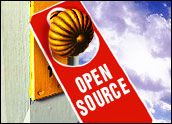
Don’t make celebratory plans just yet to join the Open Source Solaris Community: Sun Microsystems is only saying that it is looking at its plans to open up the Solaris source code, meaning it could happen months from now, years from now or, in fact, never.
Despite reports yesterday that it was a done deal, Sun is now backtracking, confusing just about everyone as to exactly what changes, if any, the company will make to the Solaris licensing and development model. Adding to that problem is the lukewarm reception that the proposal, and the way Sun announced it, is receiving.
“Sun is spawning some of the rumors without giving details, which I think is bad form,” George Weiss, vice president and research director at Gartner, told LinuxInsider in an exclusive interview. Why are they saying this now? “Sun has been recently troubled by competitive dynamics in the Unix market, HP and IBM are a bit stronger, the dot-com implosions happened, and — this is my thinking — they are trying to consider what other methods they can find to bring Solaris to the center of the universe again,” he said.
“I think they’re wasting their time,” Harvard Research Group vice president of Linux strategy Bill Claybrook told LinuxInsider. “If they had released the source code for Solaris four to five years ago, like they first talked about, … and directed it to Intel, they would have killed Linux, because right now Solaris is a better operating system than Linux. It has more features, it’s more robust, it scales to more processors,” he said.
“But now there’s such a huge movement behind Linux, it’s such a grassroots thing, it’s very hard thing to come out now and attract the same kind of passion that Linux does,” Claybrook added.
Sun Needs Something
Some see all the fuss as a way to keep Sun’s name attached to Linux, at least for now. There has been a flurry of Linux announcements recently from Computer Associates, IBM, HP and other industry players.
Sun, which is the only major server player to lose market share in the past couple of years, announced a partnership with Fujitsu on June 1st, saying it will merge its core product lines by 2006. Its stock is down, even as other tech stocks have stabilized, and the news in Shanghai didn’t help it any.
“Unfortunately, I think Sun is in a situation right now in which it is attempting to tell the world it believes a new business model is necessary and that they are going to probably go quite a ways toward upsetting some of the framework or assumptions that the market goes under,” said Weiss.
“One of these has been the subscription-based assumption that Jonathan [Schwartz] has talked about,” Weiss said. “These aren’t really revolutionary concepts. They arise out of the open-source community process. The open sourcing of Solaris is just one more way that they’ve considered of dealing with the disruptive influence of Linux.”
The Ingres Myth
Last week, Computer Associates announced that, among other products, it also will release the source code to its Ingres relational database, which, to some observers, made the company sound as if it was going after the open-source community. Or maybe not.
“Whenever you have a product like that that’s not going anywhere, they think, ‘Let’s open source it and create a community around it.’ Who’s going to volunteer to create a community and do work around Ingres? If there isn’t any community around it, it isn’t going to go anywhere,” said Claybrook.
Current speculation, then, is that perhaps Sun put out an open-source balloon with a Solaris wrapper to see if it would rise to the stratosphere.
The strange goings-on within Sun began during its quarterly update meeting in Shanghai on Wednesday. Sun executive vice president of software John Loiacono and newly appointed COO Jonathan Schwartz seemed to confirm the eagerly awaited announcement that Sun would open source its license for Solaris, its highly touted operating system.
After first denying it, the company later issued this statement: “At SunNetwork Shanghai, Jonathan Schwartz and John Loiacono discussed Sun’s intentions to create a rich, open environment around its enterprise-class Solaris Operating System. At this time, Sun is in the process of soliciting customer feedback in refining various aspects of the project and is not discussing additional information, such as launch timing, licensing models or other details.”
Assuaging Customers
Throughout the day, Sun issued several statements, seemingly to assuage customers and analysts alike. In the afternoon, the company acknowledged Loiacono’s and Schwartz’s comments and said, in part, that it was “soliciting customer feedback in refining various aspects of the project.”
Later, it issued this terse statement: “According to the Burton Group, Sun has contributed more to the open-source software community than any other vendor, including IBM (Open Source Software: Risks and Rewards, Burton Group, October 30, 2003).”
Finally, by late afternoon, Sun issued this statement, attributing it to Graham Lovell, director of operating systems marketing: “Sun is as committed to the open-source community as ever. In fact, according to the Burton Group, Sun has contributed more to the open-source software community than any other vendor, including IBM…. We’ll continue to provide engineering support for Apache, Mozilla, Gnome, Grid, OpenOffice, JXTA, OSDL, etc. Sun’s high levels of support to these organizations speaks to our open-source commitment. That includes our commitment in our own products, such as Java Desktop System — which greatly increases the visibility of open-source-based products in the enterprise.”
Claybrook agreed that Sun has a great deal of experience with open source: “Sun has as much or more open-source experience than HP, certainly more than IBM does,” he said, pointing out that Sun’s founders, Scott McNealy and Bill Joy, were two of the key developers of BSD Unix in the early 1980s.
However, whether that matters at this juncture seems to be a matter of both opinion and time.













































